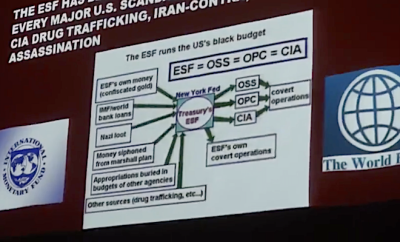 AndrewGavinMarshall.com
AndrewGavinMarshall.com
Banksters
Blaming the Victim: Greece is a Nation Under Occupation
from Andrew Gavin Marshall:
In the early hours of July 16, the Greek Parliament passed a host of austerity measures in order to begin talks on a potential third bailout of 86 billion euros. The austerity measures were pushed onto the Parliament by Greece’s six-month-old leftist government of Syriza, elected in late January with a single mandate to oppose austerity. So what exactly happened over the past six months that the first anti-austerity government elected in Europe has now passed a law implementing further austerity measures?
One cannot properly assess the political gymnastics being exercised within Greece’s ruling Syriza party without placing events in their proper context. It is inaccurate to mistake the actions and decisions of the Greek government with those taken by an independent, sovereign and democratic country. Greece is not a free and sovereign nation. Greece is an occupied nation.
Since its first bailout agreement in May of 2010, Greece has been under the technocratic and economic occupation of its bailout institutions, the European Commission, the European Central Bank (ECB), and the International Monetary Fund (IMF). For the past five years, these three institutions known as ‘the Troika’ (though now referred to as ‘the Institutions’) have managed bailout programs in Greece and other nations of the eurozone. In return for loans, they got to dictate the policies and priorities of governments.
Behind the scenes, Germany rules an economic empire expanding across Europe, enforcing its demands upon debtor nations in need of aid, operating largely through the European Union’s various institutions and forums. Germany has consistently demanded harsh austerity measures, structural reforms, and centralization of authority over euro-member nations at the EU-level.
Greece has served as a brutal example to the rest of Europe for what happens when a country does not follow the orders and rules of Germany and the EU’s unelected institutions. In return for financial loans from the Troika, with Germany providing the largest share, Greece and other debtor nations had to give up their sovereignty to unelected technocrats from foreign institutions based in Brussels (at the European Commission), Frankfurt (at the ECB), Washington, D.C. (at the IMF), and with ultimate authority emanating from foreign political leaders in Berlin (at the German Chancellery and Finance Ministry).
The Troika would send teams of ‘inspectors’ on missions to Athens where they would assess if the sitting government was on track with its promised reforms, thus determining whether they would continue to disburse bailout funds. Troika officials in Athens would function as visiting emissaries from a foreign empire, accompanied by bodyguards and met with protests by the Greek people. The ‘inspectors’ from Brussels, Frankfurt and Washington would enter Greek government ministries, dictating to the Greek government and bureaucracy what their priorities and policies should be, with the ever-present threat to cut off funds if their demands were not followed, holding the fate of successive governments in their hands. Thus, unelected officials from three undemocratic and entirely unaccountable international institutions were dictating government policy to elected governments.
In addition to this immense loss of sovereignty over the past five years, Greece was subjected to further humiliation as the European Commission established a special ‘Task Force for Greece’ consisting of 45 technocrats, with 30 based in Brussels and 15 at an outpost in Athens, headed by Horst Reichenbach, dubbed by the Greek press as the ‘German Premier’. European and German officials had pushed for “a more permanent presence” in Greece than the occasional inspections by Troika officials. Thus, the Task Force was effectively an imperial outpost overseeing an occupied nation.
When a nation’s priorities and policies are determined by foreign officials, it is not a free and sovereign nation, but an occupied country. When unelected technocrats have more authority over a nation than its elected politicians, it is not a democracy, but a technocracy. Germany and Europe’s contempt and disregard for the democratic process within occupied (bailout) countries has been clear for years.
When Greece’s elected Prime Minister George Papandreou called for a referendum on the terms of Greece’s second bailout in late 2011, German Chancellor Angela Merkel, French President Nicolas Sarkozy, and Europe’s unelected rulers were furious. The economic occupation and restructuring of a nation was too important to be left to the population to decide. Europe’s leaders acted quickly and removed the elected government from power in a technocratic coup, replacing Mr. Papandreou with the former Vice President of the European Central Bank, Lucas Papademos. Thus, a former top official of one of the Troika institutions was put in direct control of Greece.
Papademos, who was not elected but appointed by foreign powers, had two major mandates from his German-Troika overlords: impose further austerity and conclude an agreement for a second bailout. Within a week of the coup, the EU and IMF demanded that the leaders of Greece’s two large political parties, New Democracy and PASOK, “give written guarantees that they will back austerity measures” and follow through with the bailout programs.
Troika officials and European finance ministers wanted to ensure that regardless of what political party wins in future elections, the Troika and Germany would remain the rulers of Greece. Troika officials threatened that unless political party leaders sign written commitments they would continue to withhold further bailout funds from being disbursed to Greece. So the leaders signed their commitments. The leaders of Greece’s two main political parties, Antonis Samaras (New Democracy) and Evangelos Venizelos (PASOK), which had governed the country for the previous several decades, “became reluctant partners, propping up a new prime minister.” In February of 2012, the new Greek government agreed to a second major bailout with the Troika and Germany, thus extending the economic occupation of the country for several more years.
Greece was set to hold elections in April of 2012 to find a suitable ‘democratic’ replacement for the ‘technocratic’ government of Lucas Papademos. But German Finance Minister Wolfgang Schauble was growing impatient with Greece, and publicly called for the elections to be postponed and to keep a technocratic government in power for longer. As the Financial Times noted in February of 2012, the European Union “wants to impose its choice of government on Greece – the eurozone’s first colony,” noting that Europe was “at the point where success is no longer compatible with democracy.”
But the elections ultimately took place in May of 2012, though Greece’s fractured political parties failed to form a coalition government, and thus set the country on course for a second round of elections the following month. The May elections were seen as a major rejection of the bailouts and the two parties that had dominated Greece for so long, marking the rise of the neo-Nazi Golden Dawn party on the far-right and Syriza on the left.
But with a second round of elections set for June of 2012, Europe’s leaders repeated their threats to the democratic process in Greece. The Troika threatened to withhold bailout funds until the next government approved the package of reforms demanded by the creditors. Jorg Asmussen, a German member of the Executive Board of the ECB, warned, “Greece must know that there is no alternative to the agreed to restructuring arrangement, if it wants to stay a member of the euro zone.” The German President of the European Parliament, Martin Schulz, said that, “The Greek parties should bear in mind that a stable government that holds to agreements is a basic prerequisite for further support from the euro-zone countries.” As Philip Stephens wrote in the Financial Times, “As often as Greece votes against austerity, it cannot avoid it.”
At a May meeting of the Eurogroup of finance ministers, it became clear that Europe’s rulers were increasing their threats and ultimatums to Greece. “If we now held a secret vote about Greece staying in the euro zone,” noted Eurogroup President Jean-Claude Juncker (who is now president of the European Commission), “there would be an overwhelming majority against it.”
When the second elections were held the following month, the conservative New Democracy party won a narrow victory over Syriza, forming a coalition with two other parties in order to secure a majority to form a new government. Upon the announcement of a new coalition government on June 20, 2012, Chancellor Angela Merkel of Germany warned that Greece “must stick to its commitments.” Antonis Samaras of New Democracy was the third prime minister of Greece since the bailout programs began in 2010, and led the country as a puppet of its foreign creditors until his government collapsed in late 2014 and he called for elections to be held at the end of January of 2015.
Upon the collapse of the government, Alexis Tsipras, the leader of Syriza, declared that, “austerity will soon be over.” German Finance Minister Wolfgang Schauble warned that new elections in Greece “will not change any of the agreements made with the Greek government,” which “must keep to the contractual agreements of its predecessor.”
Jean-Claude Juncker, who was the newly-appointed (unelected) President of the European Commission, warned that Greeks “know very well what a wrong election result would mean for Greece and the eurozone,” adding that he would prefer “known faces” to rule Greece instead of “extreme forces,” in a reference to Syriza. A couple weeks before the elections, the European Central Bank threatened to cut its funding to Greece’s banking system if a new government rejected the bailout conditions.
Syriza won the elections on January 25, 2015, forming a coalition government with the Independent Greeks, a right-wing anti-austerity party. Alexis Tsipras, who would become Greece’s fourth prime minister in as many years, declared “an end to the vicious circle of austerity,” adding, “The troika has no role to play in this country.” Christine Lagarde, the Managing Director of the IMF, warned, “There are rules that must be met in the eurozone,” while a member of the executive board of the ECB added, “Greece has to pay, those are the rules of the European game.”
Nine days after the election, the ECB cut off its main line of funding to Greek banks, forcing them to access funds through a special lending program which comes with higher interest rates. Mark Weisbrot of the Center for Economic and Policy Research suggested that following Syriza’s election victory, the strategy of European officials was “to do enough damage to the Greek economy during the negotiating process to undermine support for the current government, and ultimately replace it.” The ECB, under its President Mario Draghi, quickly took a hardline approach to dealing with Greece, increasing the pressure on Athens to reach a deal with its creditors.
Read More @ AndrewGavinMarshall.com

















